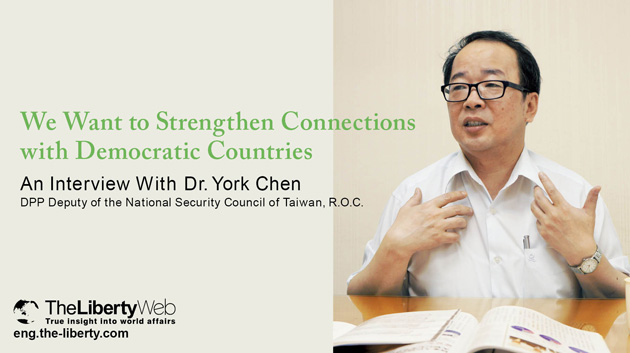We Want to Strengthen Connections With Democratic Countries
Dr. York Chen Interview
The Tsai Ing-wen administration started in May. So we interviewed York Chen from the Democratic Progressive Party, just before he assumed office as Deputy of the National Security Council of Taiwan, R.O.C.
Dr. York Chen
Currently serving as Assistant Professor of the Graduate Institute of International Affairs and Strategic Studies at Tamkang University, he completed his MA in International Affairs and Strategic Studies at Tamkang University. After completing his doctoral degree at Lancaster University in the UK, he has been a principle member of the national defense team in the DPP, engaged in the planning of the national security policy.
Taiwan and China have what is called cross-strait relations: the debate as to whether Taiwan is an independent country, or a part of China. Taiwan claims to be a country founded independently of China, but for China, annexing Taiwan has been their long sought ambition.
If Taiwan is annexed by China, it will put Japan’s national defense in danger. The Taiwan issue is a very important factor in Japan’s national security.
Interview
Interviewer (I): What will happen to the Taiwan-China relationship under the Tsai administration?
Chen (C): In this cross-straight relations debate of whether or not Taiwan is part of China, Taiwan has always maintained its stance on independence. When Taiwan withdrew from the UN in 1971, however, we became more isolated in the world, and China’s stance began to have more influence in the international community. Taiwan and China have been moving in parallel, never to converge.
For a while recently, media reports have been focusing on the differences between Taiwan and China’s opinions. But I think it’s more important to look for the similarities – the bits that we agree on – in our thinking.
Many Taiwanese businesses have been increasingly dependent on China’s economy, but in the past there were many Taiwanese businessmen who expanded their enterprises into China and made huge losses from investing there. So, many regretting businesses withdraw from China.
Taiwan is a democratic country. It is not a part of China, and we want to strengthen connections with democratic countries with mutual understanding, such as Vietnam, the Philippines and Malaysia.
From Civilian Exchanges to Semi-Military Cooperation
(I): Taiwan and Japan have no diplomatic relations. How will Taiwan strengthen ties with Japan?
(C): The Japanese Prime Minister Shinzo Abe has the desire to engage in friendly Taiwan-Japan relations, so now is the best time to strengthen connections.
Many Taiwanese people who are feeling China’s menace want to deepen military ties with Japan. More specifically, they want Japan to export submarine technology to Taiwan.
In reality, however, the current diplomatic and security relations between Taiwan and Japan are almost non-existent, so it is very difficult to suddenly deepen connections in national security. Of course Japan is also wary of China, so it would be troubling for them if Taiwan were to request such a thing. It would be best for Taiwan and Japan to get closer slowly, step-by-step, in order not to stimulate China.
This could be done through connections in the fishing business, earthquake reliefs or cyber security. What I mean is, we should deepen ties starting from things less related to politics. We should start from civilian exchanges and gradually move onto military relations.
If the governments of Taiwan and Japan can’t directly exchange military information, this could be done via private business enterprises, such as sharing Taiwan’s radar information on North Korean missiles, and eventually Japan’s submarine technology. This way we can deepen ties without provoking China.
Autonomous Defense that Does Not Rely on Other Countries
(I): What will happen to Taiwan if the U.S. military withdraws from Asia?
(C): For a long time already, Taiwan has been an orphan to Asia and the world in terms of diplomacy and national defense. We are used to being lonely, so we never expect much from outside countries, even the U.S.
With regards to our national defense strategy, we plan to not rely too heavily on other countries and to arrange an autonomous defense system. I think Japan should also not rely too much on U.S. power. If we both need to start somewhere, it would be by protect our own country ourselves.



















